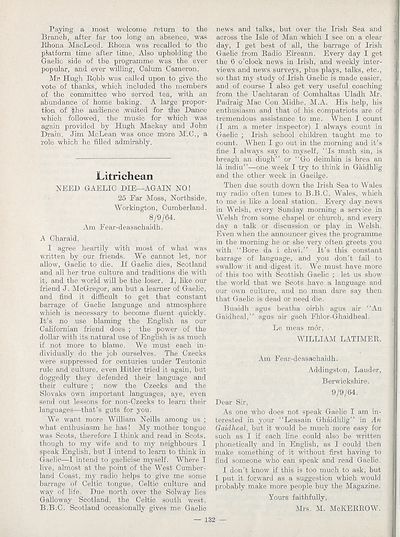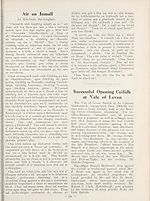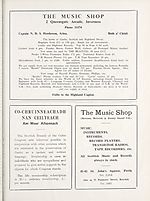An Comunn Gàidhealach Publications > Gaidheal > Volumes 58--62(part), January, 1963--March 1967
(380) Page 132
Download files
Complete book:
Individual page:
Thumbnail gallery: Grid view | List view

Paying a most welcome return to the
Branch, after far too long an absence, was
Bhona MacLeod. Bhona was recalled to the
platform time after time. Also upholding the
Gaelic side of the programme was the ever
popular, and ever willing, Calum Cameron.
Mil Hugh Bpbb was called upon to give the
vote of thanks, which included the members
of the committee who served tea, with an
abundance of home baking. A large propor¬
tion of (the audience waited for tjhp Dance
which followed, the music for which was
again provided by Hugh Mackay and John
Drain. Jim McLean was once more M.G., a
rolie which he filled admirably.
Litrichean
NEED GAELIC DIE—AGAIN NO!
25 Far Moss, Northside,
Workington, Cumberland.
8/9/64.
Am Fear-deasachaidh.
A Char aid,
I agree heartily with most of what was
written by our friends. We cannot let, nor
allow, Gaelic to die. If Gaelic dies, Scotland
and all her true culture and traditions die with
it, and the world will be the loser. I, like our
friend J. McGregor, am but a learner of Gaelic,
and find it difficult to get that constant
barrage of Gaelic language and atmosphere
which is necessary to become fluent quickly.
It’s no use blaming the English as our
Californian friend does ; the power of the
dollar with its natural use of English is as much
if not more to blame. We must each in¬
dividually do the job ourselves. The Czechs
were suppressed for centuries under Teutonic
rule and culture, even Hitler tried it again, but
doggedly they defended their language and
their culture ; now the Czechs and the
Slovaks own important languages, aye, even
send out lessons for non-Czecks to learn their
languages—that’s guts for you.
We want more William Neills among us ;
what enthusiasm he has! My mother tongue
was Scots, therefore I think and read in Scots,
though to my wife and to my neighbours I
speak English, but I intend to learn to think in
Gaelic—I intend to gaelicise myself. Where I
live, almost at the point of the West Cumber¬
land Coast, my radio helps to give me some
barrage of Celtic tongue, Celtic culture and
way of life. Due north over the Solway lies
Galloway Scotland, the Celtic south west.
B.B.C. Scotland occasionally gives me Gaelic
news and talks, but over the Irish Sea and
across the Isle of Man which I see on a clear
day, I get best of all, the barrage of Irish
Gaelic from Badio Eireann. Every day I get
the 6 o’clock news in Irish, and weekly inter¬
views and news surveys, plus plays, talks, etc.,
so that my study of Irish Gaelic is made easier,
and of course I also get very useful coaching
from the Uachtaran of Comhaltas Uladh Mr.
Padraig Mac Con Midhe, M.A. His help, his
enthusiasm and that of his compatriots are of
tremendous assistance to me. When I count
(I am a meter inspector) I always count in
Gaelic ; Irish school children taught me to
count. When I go out in the morning and it’s
fine I always say to myself, “Is math sin, is
breagh an diugh” or “Go deimhin is brea an
la indiu’’—one week I try to think in Gaidhlig
and the other week in Gaeilge.
Then due south down the Irish Sea to Wales
my radio often tunes to B.B.C. Wales, which
to me is like a local station. Every day news
in Welsh, every Sunday morning a service in
Welsh from some chapel or church, and every
day a talk or discussion or play in Welsh.
Even when the announcer gives the programme
in the morning he or she very often greets you
with “Bore da i chwi.” It’s this constant
barrage of language, and you don’t fail to
swallow it and digest it. We must have more
of this too with Scottish Gaelic ; let us show
the world that we Scots have a language and
our own culture, and no man dare say then
that Gaelic is dead or need die.
Buaidh agus beatha oirbh agus air “An
Gaidheal,’’ agus air gach Fhior-Ghaidheal.
Le meas mor,
WILLIAM LATIMEB.
Am Fear-deasachaidh.
Addingston, Lauder,
Berwickshire.
9/9/64.
Dear Sir,
As one who does not speak Gaelic I am in¬
terested in your “Leasain Ghdidhlig’’ in An
Gaidheal, but it would be much more easy for
such as I if each line could also be written
phonetically and in English, as I could then
make something of it without first having to
find someone who can speak and read Gaelic.
I don’t know if this is too much to ask, but
I put it forward as a suggestion which would
probably make more people buy the Magazine.
Yours faithfully,
Mrs. M. McKEBBOW.
Branch, after far too long an absence, was
Bhona MacLeod. Bhona was recalled to the
platform time after time. Also upholding the
Gaelic side of the programme was the ever
popular, and ever willing, Calum Cameron.
Mil Hugh Bpbb was called upon to give the
vote of thanks, which included the members
of the committee who served tea, with an
abundance of home baking. A large propor¬
tion of (the audience waited for tjhp Dance
which followed, the music for which was
again provided by Hugh Mackay and John
Drain. Jim McLean was once more M.G., a
rolie which he filled admirably.
Litrichean
NEED GAELIC DIE—AGAIN NO!
25 Far Moss, Northside,
Workington, Cumberland.
8/9/64.
Am Fear-deasachaidh.
A Char aid,
I agree heartily with most of what was
written by our friends. We cannot let, nor
allow, Gaelic to die. If Gaelic dies, Scotland
and all her true culture and traditions die with
it, and the world will be the loser. I, like our
friend J. McGregor, am but a learner of Gaelic,
and find it difficult to get that constant
barrage of Gaelic language and atmosphere
which is necessary to become fluent quickly.
It’s no use blaming the English as our
Californian friend does ; the power of the
dollar with its natural use of English is as much
if not more to blame. We must each in¬
dividually do the job ourselves. The Czechs
were suppressed for centuries under Teutonic
rule and culture, even Hitler tried it again, but
doggedly they defended their language and
their culture ; now the Czechs and the
Slovaks own important languages, aye, even
send out lessons for non-Czecks to learn their
languages—that’s guts for you.
We want more William Neills among us ;
what enthusiasm he has! My mother tongue
was Scots, therefore I think and read in Scots,
though to my wife and to my neighbours I
speak English, but I intend to learn to think in
Gaelic—I intend to gaelicise myself. Where I
live, almost at the point of the West Cumber¬
land Coast, my radio helps to give me some
barrage of Celtic tongue, Celtic culture and
way of life. Due north over the Solway lies
Galloway Scotland, the Celtic south west.
B.B.C. Scotland occasionally gives me Gaelic
news and talks, but over the Irish Sea and
across the Isle of Man which I see on a clear
day, I get best of all, the barrage of Irish
Gaelic from Badio Eireann. Every day I get
the 6 o’clock news in Irish, and weekly inter¬
views and news surveys, plus plays, talks, etc.,
so that my study of Irish Gaelic is made easier,
and of course I also get very useful coaching
from the Uachtaran of Comhaltas Uladh Mr.
Padraig Mac Con Midhe, M.A. His help, his
enthusiasm and that of his compatriots are of
tremendous assistance to me. When I count
(I am a meter inspector) I always count in
Gaelic ; Irish school children taught me to
count. When I go out in the morning and it’s
fine I always say to myself, “Is math sin, is
breagh an diugh” or “Go deimhin is brea an
la indiu’’—one week I try to think in Gaidhlig
and the other week in Gaeilge.
Then due south down the Irish Sea to Wales
my radio often tunes to B.B.C. Wales, which
to me is like a local station. Every day news
in Welsh, every Sunday morning a service in
Welsh from some chapel or church, and every
day a talk or discussion or play in Welsh.
Even when the announcer gives the programme
in the morning he or she very often greets you
with “Bore da i chwi.” It’s this constant
barrage of language, and you don’t fail to
swallow it and digest it. We must have more
of this too with Scottish Gaelic ; let us show
the world that we Scots have a language and
our own culture, and no man dare say then
that Gaelic is dead or need die.
Buaidh agus beatha oirbh agus air “An
Gaidheal,’’ agus air gach Fhior-Ghaidheal.
Le meas mor,
WILLIAM LATIMEB.
Am Fear-deasachaidh.
Addingston, Lauder,
Berwickshire.
9/9/64.
Dear Sir,
As one who does not speak Gaelic I am in¬
terested in your “Leasain Ghdidhlig’’ in An
Gaidheal, but it would be much more easy for
such as I if each line could also be written
phonetically and in English, as I could then
make something of it without first having to
find someone who can speak and read Gaelic.
I don’t know if this is too much to ask, but
I put it forward as a suggestion which would
probably make more people buy the Magazine.
Yours faithfully,
Mrs. M. McKEBBOW.
Set display mode to:
![]() Universal Viewer |
Universal Viewer | ![]() Mirador |
Large image | Transcription
Mirador |
Large image | Transcription
| An Comunn Gàidhealach > An Comunn Gàidhealach Publications > Gaidheal > Volumes 58--62(part), January, 1963--March 1967 > (380) Page 132 |
|---|
| Permanent URL | https://digital.nls.uk/127153341 |
|---|
| Description | This contains items published by An Comunn, which are not specifically Mòd-related. It includes journals, annual reports and corporate documents, policy statements, educational resources and published plays and literature. It is arranged alphabetically by title. |
|---|
| Description | A collection of over 400 items published by An Comunn Gàidhealach, the organisation which promotes Gaelic language and culture and organises the Royal National Mòd. Dating from 1891 up to the present day, the collection includes journals and newspapers, annual reports, educational materials, national Mòd programmes, published Mòd literature and music. |
|---|---|
| Additional NLS resources: |
|

